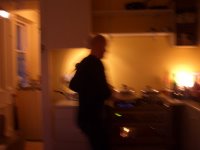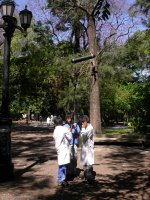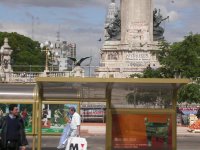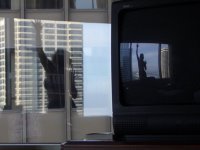On Radio 4's
Learning Curve last week the most interesting point made was one that none of us managed to address properly. Loosely paraphrasing, Libby Purves said "in a world in which everything must be assessed and graded in order to keep everyone safe, the less safe everyone feels." A succinct summary of a major problem. Likewise, a number of
recent reports are questioning what is the point of all the assessment to which young people are subjected. Is it for their benefit (
"assessment is for learning", as they like to say in Scotland), or to keep track of how the school is performing in comparison to others and in comparison to national 'norms'? So who is being assessed? The learner or the institution? The answer, surely, is 'both' - but there is very limited evidence that all this assessment, and even worse, testing, is
having much effect on anyone's ability to learn, or on teachers' ability to teach effectively.
So, at worst, does the obsession with measuring student attainment in order to compare institutions (the apparatus of institutional comparison) actually divert teachers' attention from meeting the needs of individual learners?
Who is all the assessment and audit for? OK, so there's a need to know whether public money is well spent, hence the intense scrutiny of public services. But the audit industry around education (and other public services) creates a culture of performativity which certainly feels something like a straight-jacket to those people who are working in it. Someone recently said "the English spend millions trying to prove that the system provides value for money". Creativity in this context is heavily circumscribed by regulation, bureaucracy and hierarchy. This is a tension that creative practitioners have to address all the time.
The
literature on public sector innovation doesn't really address the profound tension between the conditions needed for innovation and the conditions imposed by a normative
audit culture. But in the business world, some companies do seem to manage to innovate products and services - and balance regulation and accountability. The difference, broadly, seems to me to be that the public sector isn't generally very good at learning and that it's not just a business - it's not ruled by relatively straightforward goals and objectives, i.e. to sell things or services and make profits from doing so. The 'products' and 'services' of education are complex and contested. The public sector is also very distracted from learning, by the huge burden imposed by reporting, audit and inspection. Can reporting and inspection be used to promote reflection and learning, rather than appearing to be non-negotiable judgements handed down from higher authorities?
And is the obsession with 'raising attainment' just creating a culture of conformity? Essentially does it encourage schools to 'select out' the learners that represent the most risky proposition? It certainly forces institutions to compete for the students that they think will improve their position in the output and attainment tables. Why would schools or universities want to admit students who might adversely affect their performance in the educational 'bottom line'? Who might be costly to support and difficult to teach, or might challenge normative versions of what education is about or what it is for? As I said in
my book "a climate of performativity is likely to create a risk-averse management culture in which teachers retreat into standardised and normative versions of teaching and learning."
Surely the issue is more to do with how risk is managed (and who is doing the managing), rather than the idea that risk can be eliminated completely. And
narratives of risk are not without their own racialised, culturalised, ethnic, class dimensions. As
Stanley Aronowitz says, we should be asking "What is at risk here? Who put these students at risk?" When 'experts' say that it might be 'too risky' to adopt a new or experimental approach to teaching and learning, perhaps the first step is to question the status and perspective of the expert. Too risky for whom? The students or the underlying cultural values/norms of the institution? Postcolonial theory has something to say about this.
Supporting creativity necessarily involves a leap into the unknown. Equally, just talking about encouraging 'risk taking' in an understandably risk-averse public sector culture without differentiating between acceptable and unacceptable risk isn't too smart either. Institutions need values and 'missions', and quality assurance and planning systems, although mechanical and normative, have a place. There has to be a clear ethical framework for work with learners. And curriculum planning is the cultural architecture of learning. However, these cultures need to be open to question, debate, reformation and reinvention. Isn't that why we suggest that public servants should be professionals and employ professional judgement? Isn't that why we maintain the idea of a teaching profession so that there are appropriate values and ethics to underpin these kinds of professional choices?
For what it's worth,
this somewhat lengthy abstract gives a sense of where my thinking on the notion of creative partnership, as an emergent form of new, collaborative, networked 'curriculum architecture', is at the moment. Interestingly, conversations with my partner Jackie about the constraints on innovation within the health sector throw up similar issues. There's an article to be written, when we manage to get round to it...
On the other hand, perhaps the issue is as much to do with the ways in which individual managers and practitioners
internalise the audit culture, and use its techniques to constrain innovation and disempower others, as it is to do with trying to change structures and systems. When you're trying to manage a situation on the ground, there's inevitably a sense of some tension between the idea of providing a public entitlement, maintaining quality and standards in services, and the need to experiment and take (managed) risks in order to innovate. What is needed is imaginative and intelligent funding and management regimes that don't treat the people 'delivering' public services as technicians to do the bidding of the centre but rather partners - experts - in improving and developing the quality of what is 'delivered.' So professional learning, research and development and professional dialogue becomes critical. Interestingly, even the National Audit Office says in a
recent report:"Government departments should build stronger partnerships with local bodies and come to a better understanding of the challenges they face."
The introduction to
Bob Jeffrey's recent book summarises some of the issues pretty intelligently: performativity as "a principle of governance that enables strictly functional relationships to develop between a state and its inside and outside environments over and against the older policy technologies of professionalism and bureaucracy, through the institutionalisation of new management techniques and the development of 'mutual instrumentalism' (
Ball, 2003). Performativity is a technology, a culture and mode of regulation that employs judgements, comparisons and displays as a means of incentive, control and change."
So my anxiety is that creativity discourse, harnessed to an uncritical performativity culture, constructs learners - and even teachers - as if all they are is individual 'creative entrepreneurs'. It maintains the idea that schooling is fundamentally about the needs of the economy -
everyone is then a competitor - and downgrades the social, cultural, civic, interpersonal aspect of learning. What about the education of persons? We need to get beyond the idea that school is just the education of workers and is only about improving economic productivity (for whom?). Entrepreneurship should be one component in a balanced educational diet, but not the only ingredient. The rationale for education is as much social as it is economic. And even with all the rhetoric about personalised learning, the dominant discourse is still one of the learner (and parents) as consumers of educational services rather than participants...and teachers as 'deliverers' rather than 'designers.'
So where is this debate going? Thoughts, anyone?
 Staring at the computer screen with my eyes sagging and my neck aching, mid-afternoon, with the sun shining brightly outside, made me reflect on how many personal channels of communication we have to manage and maintain...and working simultaneously on multiple projects and with multiple teams of people just intensifies this sense of being informationally and emotionally challenged....
Staring at the computer screen with my eyes sagging and my neck aching, mid-afternoon, with the sun shining brightly outside, made me reflect on how many personal channels of communication we have to manage and maintain...and working simultaneously on multiple projects and with multiple teams of people just intensifies this sense of being informationally and emotionally challenged....































